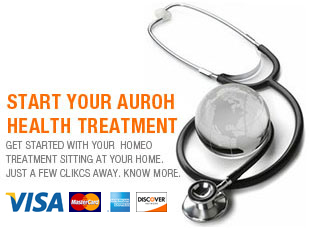|
|
||||||||||||||||||||||||||||||||||||
Psoriasis
- What is Psoriasis ?
- Psoriasis causes
- Psoriasis symptoms
- psoriasis affect joints ?
- Psoriasis symptoms & signs
- Psoriasis types
- Psoriatic arthritis
- Psoriasis fingers & toe nails
- Social impact of psoriasis
- Steroids and psoriasis
- How does it work ?
- How much time it take ?
- Conventional therapies
Psoriasis
Related Links
- Steroid Side Effects
- Psoriasis - FAQ’s
- Psoriasis - Diet
- Remedies & tips - Psoriasis
- Testimonials - Psoriasis
- Case Studies - Psoriasis
Treatment
Disease A - Z > Psoriasis > Homeopathic treatment for Psoriasis
Homeopathy treatment for Psoriasis
|
||||||||
TREATMENT FOR PSORIASIS WITHOUT SIDE EFFECTS
What is Psoriasis ?
Psoriasis is a non contagious skin condition that causes rapid skin cell reproduction resulting in red, dry patches of thickened skin. The common areas affected by psoriasis are the skin of the elbows, knees, and scalp. Psoriasis is seen worldwide, in all races, and both sexes. Psoriasis can be seen in people of any age, from babies to Adults, most commonly patients are first diagnosed in their early adult years.
Patients with more severe psoriasis may have social embarrassment, job stress, emotional distress, and other personal issues because of the appearance of their skin
Location
Commonly affected areas are on the elbows, knees, scalp, lower back, palms, and soles of the feet. However, no area of the skin is exempt, including the genital area. The disease may also affect the fingernails and toenails, and the soft tissues inside the mouth. Almost 20-25 percent of people with psoriasis have joint involvement and inflammation that produces arthritis symptoms. This condition is called psoriatic arthritis
What causes Psoriasis?
Immune Causes
Our immune system when functioning normally is designed in such a way that the white blood cells produce antibodies to fight foreign invaders like viruses and bacteria. The white blood cells also produce chemicals which help in healing and fighting infective agents. In Psoriasis and other auto immune disorders these White blood cells cause the body to fight with normal tissues and cells of the skin and occasionally the joints. These WBC’s sometimes also produce abnormal amount of healing chemical which causes more inflammation in the skin and joints
Genetic Causes
Scientists and researchers have found 4 important genes that are involved in Psoriasis. The regulation of Human Leukocyte Antigen (HLA) is the function of these genes. The HLA molecules are designated with the process of presenting the foreign substances to the immune system so they can be destroyed. However in psoriasis this process is malfunctioning. Patients having a specific HLA genetic factor called HLA-CW6 have a tendency to develop psoriasis at early age. But research shows only 10-15% people harboring these genes develop Psoriasis. Hence there are other factors required to trigger psoriasis,one of them is prolonged Stress
Weather Triggers
Another strong factor in Psoriasis is weather. Generally cold, dry weather starts psoriasis flare-up and the symptoms are in aggravated form during this time. Though during hot, sunny or damp weather the symptoms decrease
Stress Triggers
Stress, suppressed anger and emotional problems like anxiety and depression are strongly associated with psoriasis flare ups and can be triggers as well. Studies have shown a wide range of stress factor encountered by patients during or before a psoriasis flare up. Another study showed that stress can trigger certain immune factors associated with psoriasis
Infection Triggers
Certain bacteria and viruses can cause Psoriasis flare ups. A type of Psoriasis known as Guttate psoriasis can be triggered by the bacteria called streptococcus which is known for causing infections such as tonsillitis, sinusitis. HIV is also associated with psoriasis
Skin Injury Triggers
Occasionally mild injuries to the skin such as abrasions or cuts may trigger a psoriasis flare, which is called as the koebner phenomenon, and may be the reason that psoriasis tends to frequently affect the elbows and knees
Drug Triggers
The following drugs are known to either worsen psoriasis or induce a flare-up
- Chloroquine
- ACE inhibitors such as monopril or captopril
- Beta blockers such as lopressor or atenolol
- Progesterone
- Lithium
What does psoriasis look like? What are the symptoms?
The appearance of Psoriasis patch or lesion is red or pink area of thickened, dry, shiny raised skin. Commonly affected areas include the elbows, keens and scalp. But any area of the body may be affected. The tendency of psoriasis to appear is commonly in the areas of trauma, repeated rubbing,use or abrasions. The appearance of psoriasis may vary. It may appear as large thick scaly plaques of raised skin, small flattened bumps, red patches, or pinkish dry skin or bigger flakes of dry shiny skin which sheds off, or cracks smaller or bigger which are generally preset on palms and soles. There are various types of Psoriasis like Psoriasis Vulgaris (Common), Guttate Psoriasis(small drop like spots), Inverse Psoriasis(patches on navel,underarms,buttocks), Pustular Psoriasis(lesions with pus), Erythrodermic Psoriasis, Scalp Psoriasis, Palmo Plantar Psorisis(generally with cracks). Psoriasis can also affect the nails, making them brittle and out of shape
Can psoriasis affect my joints?
Yes, psoriasis is associated with joint problems in about 20%-35% of patients. The joint disease associated with psoriasis is referred to as Psoriatic Arthritis. Patients may have inflammation of any joints (arthritis), although the joints of the hands, knees, and ankles tend to be most commonly affected. Psoriatic arthritis is an inflammatory, destructive form of arthritis and is treated with medications, like oral and topical steroids, and some times coal tar to stop the disease progression
Psoriasis Symptoms & Signs
- Skin patches
- Dry or red
- Usually covered with silvery, shiny scales
- Raised patches of skin
- Accompanied by red borders
- May crack and become painful, occasional bleeding
- Usually discrete, demarcated patches
- Usually located on the elbows, knees, trunk, scalp, hands or nails
- Skin lesions, including pustules, cracking of skin, skin redness or inflammation
- Itching generally more during winters or cold weather
- Small scaling dots on the skin (especially in children)
- Joint pain or aching, which may be associated with a special type of arthritis (psoriatic arthritis)
Additional symptoms that may be associated with this disease
- Nail abnormalities, or psoriatic nails
- Genital lesions in males
- Eye burning, itching, and discharge
- Increased tearing
Types of Psoriasis
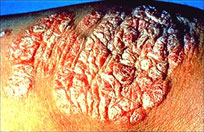
Plaque psoriasis
Plaque psoriasis is the most common form of psoriasis. It is characterized by raised, inflamed (red) lesions covered with a silvery, shiny white scale. The scale is actually an accumulation of dead skin cells. The technical name for plaque psoriasis is Psoriasis Vulgaris (vulgaris implies common). Plaque psoriasis can appear on any skin surface, though the knees, elbows, scalp, and trunk are the most common locations.
Sometimes the patches of infected skin are large, extending over much of the body. The patches, known as plaques or lesions, can wax and wane but are chronic. These can be very itchy and if scratched or scraped they may bleed easily. The itching can be worse during winters or cold weather.The plaques have a well-defined edge and, while they can appear anywhere on the body, the most commonly affected areas are the scalp, knees and elbows
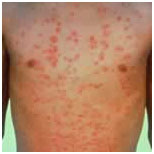
Guttate psoriasis
This generally affects people younger than 25-30 years of age and is usually triggered by a bacterial infection such as strep throat. Features are small, water drop-shaped sores on the trunk, arms, legs and scalp. The sores are covered by a fine scale and aren't as thick as plaque sores are. There may be a single outbreak that goes away on its own, or there may be repeated episodes, especially if there is an ongoing respiratory infection
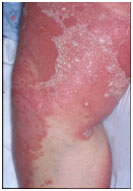
Pustular psoriasis
This is a rare form of psoriasis which can occur in bigger patches (generalized pustular psoriasis) or in smaller areas on the hands, feet or fingertips though it can cover any part of the body. It generally develops quickly, with pus-filled blisters appearing just hours after the skin becomes red and tender. The blisters dry within a day or two but may reappear every few days or weeks. Pustular psoriasis can also cause fever, chills, severe itching, weight loss and fatigue
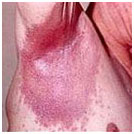
Inverse psoriasis
The lesions in this type are concentrated mainly on the skin in the armpits, groin, under the breasts and around the genitals, inverse psoriasis causes smooth patches of red, inflamed skin. It's more common in overweight people and is aggravated by friction and sweating
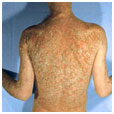
Erythrodermic psoriasis
This is the least common type of psoriasis, this can cover the entire body with a red, peeling rash that may itch or burn intensely. Eythrodermic psoriasis may be triggered by severe sunburn, by corticosteroids and other medications, or by another type of psoriasis that's poorly managed and controlled.
Psoriatic arthritis
Along with the common symptoms of inflamed, scaly, shiny skin, psoriatic arthritis causes pitted, discolored nails and the swollen, painful joints that are typical of arthritis. It can also lead to inflammatory eye conditions such as conjunctivitis. Although the disease usually isn't as crippling as other forms of arthritis, it may cause stiffness and progressive joint damage and in the most serious cases may lead to permanent deformity. Adults in their 30s, 40s and 50s are most often affected, but children also can develop a form of the disease.
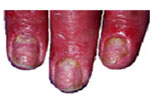
Psoriasis in finger & toe nails (Psoriatic nails )
Nearly 60 % of people with psoriasis have psoriatic changes in fingernails and/or toenails. In rare instances psoriasis may only occur in the nails and nowhere else on the body. Psoriatic changes in nails range from mild to severe, generally reflecting the extent of psoriatic involvement of the nail plate, nail matrix (tissue from which the nail grows), nail bed (tissue under the nail), and skin at the base of the nail. Damage to the nail bed by the pustular psoriasis can result in loss of the nail. Nail changes in psoriasis fall into general categories that may occur singly or all together.
The nail has a yellow to yellow-pink discoloration, probably due to psoriatic involvement of the nail bed.White areas appear under the nail plate. These are air bubbles marking spots where the nail plate is becoming detached from the nail bed (onycholysis). There may be reddened skin around the nail
Social Impact of psoriasis
A person suffering from Psoriasis can have problems with his Self-confidence, Relationships, Work/School, and Social Interactions. People with psoriasis experience a crisis in self-confidence so severe it can hamper almost every aspect of life, from the quality of a person’s love life, problems in marital relationship to performance in the job and day today social interactions. People have also reported feeling like social outcasts and being misunderstood in the public.
These are some of the dramatic insights unwrapped from a new survey of people with moderate to severe psoriasis. Psoriasis is a chronic, life altering disease that affects more than 4.5 million adults or 1 in 50 people in the United States. The survey is the most comprehensive study to date to specifically examine the social and emotional effects of psoriasis. It also illustrates the need for a public education and support program for people with psoriasis. Though Psoriasis is not a contagious disease people have a lot of myths and fears relating to this disease as not to use clothes, towels, utensils, bed, etc used by a psoriasis patient.
Steroids are dangerous for long term use
Overuse of high-potency steroids can lead to thinning of skin, internal side effects, treatment resistance, and even worsening of the psoriasis. Steroid use is known to thin the skin, accumulate inside organs such as liver and kidneys, cause and contribute to hair loss and other dangerous side effects.While topical steroids have tremendous benefit in reducing inflammation, they also have significant side effects. Most of these side effects are seen with long-term use, but some may be noticed within days of starting therapy.
Auroh Homeopathic Treatment for Psoriasis
At AUROH we emphasizes that psoriasis is not an external but an internal malady, arising out of faulty immune system with genetic predispositions. Needless to say the disease is deep seated and calls for well planned deep acting natural medicines. Conventional treatment with steroid can suppress (that is what they call ‘manage’) the symptoms of the disease but cannot cure the disease. On the other hand, it is homoeopathy that has potential to stimulate body’s natural healing capacity and to restore the disturbed immune system. The natural remedies used during Homeopathic treatment are harmless to the system and cure psoriasis completely with out any side effects.
Homeopathic provides best psoriasis treatment and has been found to be extremely effective. Physicians at AUROH have worked with psoriasis patients for over 15 yrs years. Our well researched medications have changed the treatment protocol totally. We have to our credit new medicines which have international recognition
How does it work?
- It stimulates body’s own healing process
- It works at root level and restores deviated immunity back to normalcy.
- It works by addressing the genetic tendencies
- homeopathy uses natural medicinal substances in ultra-minute quantity rendering a treatment that is extremely effective yet absolutely free from any side-effects whatsoever.
How much time does it take?
Psoriasis is an obstinate and chronic disease. There is no shortcut to its cure.
The length of treatment varies form case to case, depending of the following factors:
- Duration of Psoriasis
- Areas affected. Affection of scalp and nails takes longer.
- Extent of spread (Psoriasis only on skin is easier to treat. Joint affection (Psoriatic Arthritis) is relatively difficult to treat.)
- Previous medication (Extensive use or oral cortisone may delay the course of treatment)
- General health and associated diseases
Most patients observe positive results in about 6 to 9 weeks.
What do Conventional therapies have to offer in Psoriasis ?
Topical steroids—derived from the natural corticosteroid hormones produced by the adrenal glands—are the most frequently used treatment for psoriasis. Topical steroids are used as anti-inflammatory agents to reduce the swelling and redness of lesions
View Psoriasis case study | Read Psoriasis Testimonial
Treated Cases
- Treat Psoriasis without side effects
- Steroid Side Effects
- Psoriasis - FAQ’s
- Psoriasis - Diet
- Remedies & tips - Psoriasis
- Testimonials - Psoriasis
- Case Studies - Psoriasis
| talk to our doctors right now | 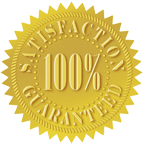 |
|
| consult our experts | ||
 |
leave your number we will call you back |
|
| start auroh health treatment |
Your doctor is just a click away |
Treatment |





